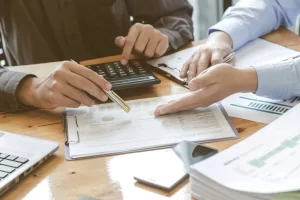Buying a property in Spain is a process that involves a number of important legal and financial steps. Whether you are interested in buying a flat, a house, or any other type of property, it is essential to understand the process to ensure a successful and legally compliant transaction. In this article, we will provide a comprehensive guide covering everything from the requirements for buying a flat between private individuals to the notary fees and taxes associated with buying and selling property.
Step by step in the purchase of a property
At the law firm of Ignacio García Taboada, we understand the importance of being well informed about all aspects of buying and selling a property. Whether you are buying or selling a property between private individuals or through estate agents, each step of the process has its own particularities and specific legal requirements. We tell you all about it:
Property search and selection
The first step in buying a property is the search and selection of the right property. This involves considering various factors such as location, size, price and the specific characteristics of the property. During this phase, it is important to research the property market and consider all available options.
Legal aspects and necessary documentation
Once you have selected a property, the next step is to address the legal aspects and gather the necessary documentation. This includes verifying the legality of buying a property, making sure that there are no encumbrances or limitations on the property.
The documentation required can vary, but generally includes the home purchase contract, title deeds, and appraisal and debt certificates. You should also take into account the notary fees at this stage.
The importance of the appraisal and property inspection
The valuation and inspection of the property are fundamental steps in the sale of a house or flat:
- The appraisal will provide you with an objective valuation of the property, which is essential for determining the purchase price and for mortgage applications.
- The property inspection, on the other hand, will help you identify any problems or necessary repairs, which is essential when buying and selling a property. These steps will help you avoid unpleasant surprises and additional costs in the future.
Expenses for the buyer
When buying a property, the buyer must be prepared to face several expenses in addition to the purchase price. These costs are necessary to complete the transaction and to ensure the legality and security of the investment:
Notary and registration fees
Notary fees are those paid to the notary for the drafting and signing of the public deed of sale. These costs vary according to the price of the property and the complexity of the process. In addition, once the deed has been signed, it is necessary to register the property in the Land Registry, which entails registration fees.
These registration fees are essential to guarantee the legal security of the transaction, as the registration in the Land Registry is what really confers the buyer the status of owner.
Taxes associated with the purchase
Taxes are an important part of the costs involved in the purchase of a property. Depending on whether it is a new or second-hand property, these may include VAT (Value Added Tax) or ITP (Transfer Tax). VAT is generally applied to new properties and is a percentage of the sale price, while ITP is applied to second-hand properties and its percentage varies according to the autonomous community.
Financing and valuation costs
If the purchase is financed through a mortgage, the financing costs must be considered, which include the opening commission of the mortgage loan and the associated interest. In addition, most financial institutions require an appraisal of the property before granting the mortgage, which implies an additional appraisal fee. This cost is necessary so that the bank can determine the real value of the property and, therefore, the maximum amount it is willing to finance.
Costs for the seller
When selling a property, the seller also faces a number of costs. These costs can have an impact on the net profit from the sale.
Sales tax
One of the main expenses for the seller is the sales tax. In Spain, this includes the plusvalia municipal, which is a tax on the increase in value of urban land. The amount of this tax depends on the length of time the seller has owned the property and the increase in value of the land. In addition, if the seller is not resident in Spain, he must take into account the 3% withholding tax on the sale price, which is considered an advance payment of income tax.
Real estate agency commissions
If the seller uses the services of an estate agent to sell his property, he will have to pay a commission. This commission varies from agency to agency and is usually calculated as a percentage of the selling price of the property. It is important that, if you are the seller, you are well informed about the fees and services included before signing a contract with an estate agent.
Other costs: Certificates and improvements to the property.
Other costs that the seller may have to bear include obtaining certificates necessary for the sale, such as the energy efficiency certificate. In addition, if the seller has made improvements to the property, these costs may increase the sale value, but also represent an investment that must be considered. These improvements can range from renovations to simple decoration or repairs needed to make the property more attractive to buyers.
The role of professionals in the sale and purchase process
The sale and purchase of real estate involves a number of professionals whose knowledge and experience are essential to ensure that the process is carried out efficiently and safely. These professionals play an indispensable role at different stages of the sale and purchase of the property.
Real estate agents: Their role in the process
Real estate agents are essential in the buying and selling of a house or buying and selling of a flat. Their knowledge of the property market helps buyers find the right property and sellers find qualified buyers.
Agents can offer valuable advice on market price, current trends and negotiation strategies. In addition, they facilitate the coordination of property viewings and can assist in the preparation of the property purchase contract.
Lawyers and notaries: guaranteeing legal certainty.
As lawyers specialising in the purchase and sale of real estate, our role is fundamental in ensuring that the entire process is carried out in accordance with the law and protecting the interests of our clients. We take care of reviewing and preparing all the necessary legal documentation, ensuring that the contracts faithfully reflect the agreements reached and that there are no clauses that could be detrimental to any of the parties involved.
Our intervention serves to prevent and resolve any legal disputes that may arise, whether before, during or after the transaction. We offer advice at every step of the process, from the review of the ownership and encumbrances of the property to the closing of the transaction, including the management of the notary formalities. In addition, we ensure that our clients are fully informed of their rights and obligations, and provide them with a clear understanding of the tax and financial aspects of the transaction. Our aim is to ensure that the sale and purchase is carried out transparently, efficiently and with maximum legal certainty.
Final tips and best practices
When approaching the sale and purchase of a property, there are a number of tips and practices that can help you ensure a successful and secure transaction.
Thorough verification of the legal documentation of the property
It is essential to carry out a detailed check of all legal documentation relating to the property. This includes the title deed, any existing encumbrances or mortgages, and any other relevant documentation. Ensuring that everything is in order can prevent future legal problems.
Detailed inspection and evaluation of the property
Before proceeding with the purchase, you should conduct a detailed inspection of the property. This involves not only a physical inspection of the property, but also an assessment of aspects such as location, surroundings and possible structural or maintenance problems.
Professional legal and financial advice
Obtaining professional legal and financial advice is essential if you are not an expert in the field. Property lawyers can provide legal guidance, while a financial advisor can help you understand the financial implications of the transaction.
Planning and management of costs associated with the transaction
It is important to plan and manage all costs associated with the transaction, including taxes, notary fees, and agency fees, among others. Good financial planning can avoid unpleasant surprises and ensure good budget management.
Negotiation and clarity on the terms of the deal
Negotiation on the terms of the agreement is essential. It is important that all parties involved have a clear understanding of what is being agreed, including price, payment terms, and any other relevant terms.
Up-to-date knowledge of the real estate market and local regulations
Keeping informed about the local property market and regulations is also very important. The market can vary significantly from one area to another, and laws and regulations can also change, so having up-to-date information will help you make informed decisions.
Final conclusions
By following these tips and practices you will be better prepared to navigate this process. However, the importance of having professional advice cannot be underestimated. At our firm, we are committed to providing the necessary guidance and support to ensure that your buying and selling experience is as smooth and safe as possible.
If you are considering buying or selling a property and need expert advice, please do not hesitate to contact us. We are here to help you every step of the way.





